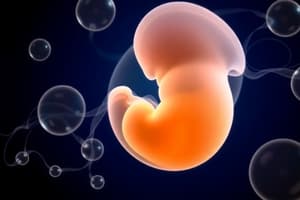Podcast
Questions and Answers
What is the primary focus of developmental psychology?
What is the primary focus of developmental psychology?
- Studying the physical development of the brain
- Understanding the three stages of prenatal development
- Investigating three major questions: what, how, and when (correct)
- Examining the acquisition of motor skills in early childhood
During which stage of prenatal development does implantation occur?
During which stage of prenatal development does implantation occur?
- Neonatal stage
- Embryonic stage (correct)
- Germinal stage
- Fetal stage
What is a teratogen?
What is a teratogen?
- A substance that aids fetal development
- An environmental agent that can cause harm to the embryo or fetus (correct)
- A type of prenatal development stage
- A motor skill acquired in early childhood
At what point in prenatal development can the spine be visibly detected?
At what point in prenatal development can the spine be visibly detected?
How advanced are newborns' senses of smell and taste?
How advanced are newborns' senses of smell and taste?
When do infants prefer to look at objects?
When do infants prefer to look at objects?
What is a key characteristic of young children (≤ 3.5 yrs.) in terms of their understanding of others' thoughts and feelings?
What is a key characteristic of young children (≤ 3.5 yrs.) in terms of their understanding of others' thoughts and feelings?
What is a benefit to a child who has a good attachment?
What is a benefit to a child who has a good attachment?
According to the Harlow monkey studies, what promotes attachment?
According to the Harlow monkey studies, what promotes attachment?
What is the characteristic of a caregiver that leads to a secure attachment style?
What is the characteristic of a caregiver that leads to a secure attachment style?
What is the characteristic of an anxious/avoidant attachment style?
What is the characteristic of an anxious/avoidant attachment style?
What is a characteristic of romantic relationships for those with a secure attachment style?
What is a characteristic of romantic relationships for those with a secure attachment style?
What is a primary function of the frontal lobes in the brain?
What is a primary function of the frontal lobes in the brain?
During adolescence, what process occurs in the frontal lobes of the brain?
During adolescence, what process occurs in the frontal lobes of the brain?
In which stage of life do individuals experience a decline in muscle strength and reaction time?
In which stage of life do individuals experience a decline in muscle strength and reaction time?
What biological event characterizes women's transition into late adulthood?
What biological event characterizes women's transition into late adulthood?
What is the major factor contributing to the decline in mental speed with age?
What is the major factor contributing to the decline in mental speed with age?
Which physical changes are most likely to occur during late adulthood?
Which physical changes are most likely to occur during late adulthood?
Flashcards are hidden until you start studying
Study Notes
Developmental Psychology Focus
- Primarily examines the growth and changes in human behavior across the lifespan.
- Emphasizes various stages, including prenatal, childhood, adolescence, and adulthood.
Prenatal Development Stages
- Implantation occurs during the germinal stage, approximately 6 to 10 days after conception.
- The spine can be visibly detected during the embryonic stage, around the 4th week of prenatal development.
Teratogen
- A teratogen is any substance or environmental factor that can cause malformation or harm to a developing fetus.
Newborn Senses
- Newborns have a well-developed sense of smell and taste, capable of distinguishing between different odors and flavors.
Infant Visual Preferences
- Infants prefer to look at high-contrast objects and patterns, typically favoring complex designs over simple ones.
Young Children's Understanding
- Children aged 3.5 years or younger often exhibit egocentrism, having difficulty understanding that others may have different thoughts and feelings.
Attachment Benefits
- A solid attachment provides children with emotional security, fostering confidence and social competence.
Harlow Monkey Studies Insights
- Harlow’s studies indicate that contact comfort, rather than nourishment, is a crucial factor in promoting attachment.
Secure Attachment Characteristics
- A caregiver who is consistently responsive to the child’s needs fosters a secure attachment style.
Anxious/Avoidant Attachment Style
- Individuals with an anxious/avoidant attachment style often display difficulty in trusting others and may avoid emotional closeness.
Romantic Relationships and Secure Attachment
- Those with a secure attachment style typically have healthier, more stable romantic relationships characterized by trust and effective communication.
Frontal Lobe Functions
- The frontal lobes are primarily responsible for higher-level functions such as reasoning, problem-solving, and impulse control.
Adolescence Brain Development
- During adolescence, significant pruning occurs in the frontal lobes, refining neural connections to enhance cognitive abilities.
Aging and Muscle Decline
- A noticeable decline in muscle strength and reaction time generally occurs during late adulthood.
Late Adulthood Transition for Women
- The transition into late adulthood for women is often characterized by menopause, marking the end of reproductive capability.
Mental Speed Decline Factors
- Decline in mental speed with age is primarily attributed to a decrease in processing efficiency and cognitive resources.
Physical Changes in Late Adulthood
- Common physical changes in late adulthood may include reduced bone density, vision and hearing impairments, and changes in skin elasticity.
Studying That Suits You
Use AI to generate personalized quizzes and flashcards to suit your learning preferences.




